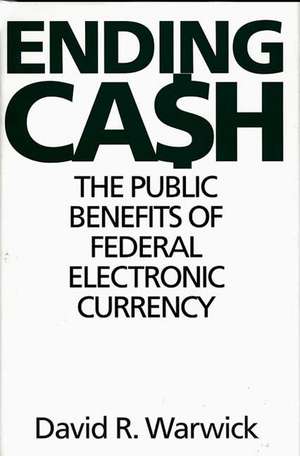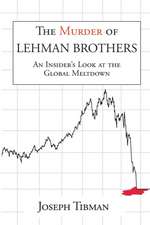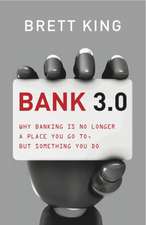Ending Cash: The Public Benefits of Federal Electronic Currency
Autor David R. Warwicken Limba Engleză Hardback – 18 noi 1998 – vârsta până la 17 ani
Preț: 437.57 lei
Preț vechi: 604.10 lei
-28% Nou
Puncte Express: 656
Preț estimativ în valută:
83.74€ • 87.10$ • 69.13£
83.74€ • 87.10$ • 69.13£
Carte tipărită la comandă
Livrare economică 14-28 aprilie
Preluare comenzi: 021 569.72.76
Specificații
ISBN-13: 9781567202397
ISBN-10: 156720239X
Pagini: 232
Dimensiuni: 156 x 235 x 22 mm
Greutate: 0.51 kg
Ediția:New.
Editura: Bloomsbury Publishing
Colecția Praeger
Locul publicării:New York, United States
ISBN-10: 156720239X
Pagini: 232
Dimensiuni: 156 x 235 x 22 mm
Greutate: 0.51 kg
Ediția:New.
Editura: Bloomsbury Publishing
Colecția Praeger
Locul publicării:New York, United States
Notă biografică
DAVID R. WARWICK is an investor, researcher, and writer living in Santa Rosa, CA. He holds an LL.B. and J.D. from Hastings College of the Law and has practiced plaintiff's personal injury law. He later turned his attention to real estate development, then to entrepreneurship in retail electronics, importing, and security hardware manufacturing. He has a patent pending for a means to make electronic bill payments via ATM and Internet terminals. Mr. Warwick is author of The Cash Free Society, an important article published in The Futurist in 1992, and of other writing for the National Council on Crime and Delinquency. He has also aired his views on National Public Radio and regional television.
Cuprins
IntroductionCash Is Killing UsWhere Is the Rising Usage of Electronic Money Taking Us?Replacing Cash With E-MoneyFederal or Private CurrenciesFederal Electronic Currency (FEDEC)Benefits of a Federal Electronic CurrencyPrivacy in an Electronic Currency SystemPractical Considerations about Electronic CurrencyThe Technical ComponentsHow Federal E-Currency Might Impact the Banking and Bankcard IndustriesConclusionEndnotesIndex















